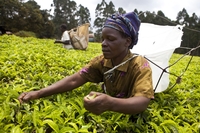Fairtrade on the menu at 2014 Commonwealth Games

Small-scale farmers and workers in the developing world should be set to benefit from the upcoming 2014 Commonwealth Games, thanks to the decision to source all bananas, tea, coffee and sugar for athletes, officials, workers and visitors as Fairtrade - following the precedent set by the London 2012 Olympics.
Fairtrade works to secure a fair deal for disadvantaged farmers and workers in more than 70 countries, including the Commonwealth nations Belize, Cameroon, Dominica, Fiji, Ghana, Grenada, Guyana, India, Jamaica, Kenya, Malawi, Mauritius, Mozambique, Namibia, Pakistan, Papua New Guinea, Rwanda, Sierra Leone, South Africa, Sri Lanka, St Lucia, St Vincent, Swaziland, Tanzania, Uganda and Zambia.
When people buy products that have been independently certified as Fairtrade, they are ensuring that the person who grew or produced them is getting a fair, stable price, as well as a premium that can be invested for the benefit of the community or to improve productivity.
Tim Gutteridge, Fairtrade Foundation’s Chief Operating Officer, said: “Choosing Fairtrade is a simple way to make a real difference to the lives of the people who work hard to produce the tea, coffee and other produce we enjoy. We congratulate the organisers of the 2014 Commonwealth Games for building on London 2012’s legacy with their clear commitment to sustainable and ethical produce, including Fairtrade.”
Glasgow, the host city for the 2014 Commonwealth Games, was declared a Fairtrade City in March 2006 in recognition of its commitment to supporting the Fairtrade movement. In 2013, Scotland became only the second country in the world to be declared a Fair Trade Nation after a six-year campaign.

